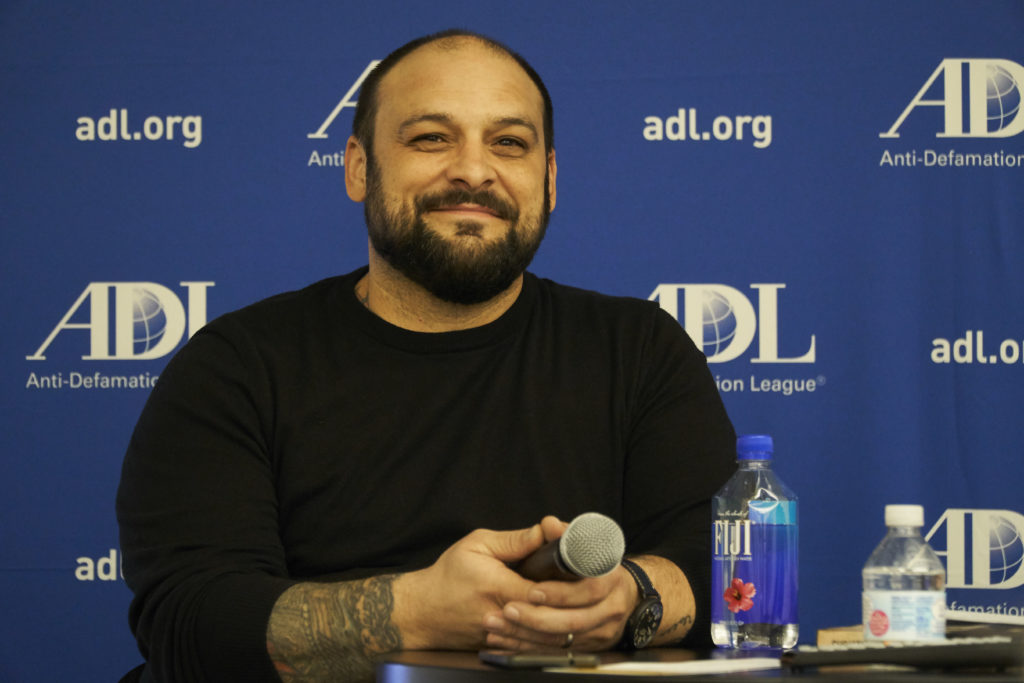By Guy Ovadia, news correspondent
A former skinhead and neo-Nazi spoke Thursday at the Cambridge Innovation Center in downtown Boston about his experience leading a violent hate group and his efforts to right his wrongs.
Christian Picciolini visited Boston to promote the republishing of his 2015 memoir and to hold a question-and-answer session hosted by the Anti-Defamation League (ADL) New England, which condemns hate speech against Jewish people.
“I was a vulnerable teenage boy,” Picciolini said. “The bullies made fun of me any chance they got. I felt marginalized and powerless and weak and unheard, and all I wanted was to be powerful.”
Picciolini was a member of the Chicago Area SkinHeads (CASH), the first neo-Nazi gang in the United States, for decades. He joined at age 15 when he was approached in an alleyway by infamous skinhead leader Clark Martell in the 1980s.
Martell, who had black boots and a shaved head, pulled the joint out of Picciolini’s mouth and said to him, ‘“Don’t you know that’s what the communists and Jews want you to do to keep you docile?”
Although Picciolini didn’t know what a communist was, what ‘docile’ meant, or if he had even met a Jew before, Martell’s charisma and promise that his bullies would stop bullying him convinced Picciolini to become a member of CASH.
“Ideology and dogma are not what radicalizes people — it’s a search for identity, community and purpose,” Picciolini said. “I struggled with my identity. Coming from an Italian family, I didn’t know if I was Italian, I didn’t know if I was American.”
Picciolini said he became fully dedicated to CASH at a young age. He got Celtic crosses and swastika tattoos. For the first time, when he spoke, people paid attention.
“I went from someone who was ultimately powerless, to someone who felt extreme power. And the violence, and the anger, and the racism, and the anti-Semitism, it focused my sense of purpose,” Picciolini said. “And because of that, I was able to eventually lead America’s largest and most infamous neo-Nazi skinhead group.”
Picciolini opened a record store that sold white-power music in 1994, but by 1995 he had become too embarrassed to continue selling the records and was forced to go out of business. Shortly afterward, his wife left him with his kids, and he began to drift away from the neo-Nazi movement because of new friends he made who didn’t approve of it. Without the skinhead community to fall back on, Picciolini succumbed to depression.
“I went through a really bad depression for five years where I woke up a lot of mornings thinking that I didn’t want to wake up,” Picciolini said. “It wasn’t until somebody told me that ‘You have an important story to tell and you need to find a way to tell it.’ I found the courage, finally, to do that.”
Picciolini left CASH behind to lead a life with a more positive purpose. He co-founded a nonprofit called Life After Hate, wrote a memoir titled “Romantic Violence: Memoirs of an American Skinhead” and graduated from DePaul University in Chicago. He also launched a media entertainment firm, Goldmill Group, and won an Emmy Award in 2016 for producing and directing an anti-hate advertising campaign.
Picciolini has also helped to reform racist people, both members of hate groups and individuals who do not belong to any racist organizations. He has introduced anti-Semites to Jews, Holocaust-deniers to Auschwitz survivors and Islamophobes to Muslims. One time, Picciolini flew to Buffalo to help a man who had felt the need to assault a Muslim man praying in a park.
“One of the first questions I asked him was, ‘Have you ever met a Muslim person?’ He said, ‘Why would I do that? I don’t want to go anywhere near them,’” Picciolini said. He took the man to a local mosque to talk to the Imam, the mosque’s religious leader. “Two-and-a-half hours later they’re hugging, we’re all crying.”
Picciolini also discussed current events and said anti-hate groups combat neo-Nazis and the Ku Klux Klan in ways that promote further violence. During events like the Charlottesville protest in August, people believed they must fight hate groups with violence. At the time, #punchanazi was trending on Twitter, along with videos of violence against racist and hateful protesters.
“We need to keep confronting them in a non-violent way,” Picciolini said, speaking about racist protesters. “That really is the only thing that works. I don’t know, ever in the history of Earth, that any racist has changed his mind because he got punched in the face.”
He continues to say that when hate groups succeed in provoking people to act violently, they win, because ultimately their goal is to bring others down to their level so that they can be depicted as a victim due to their beliefs. Picciolini said he believes that when dealing with hate, people should use counter-measures that are more peaceful.
“While it may seem counterintuitive to talk very nice to a Nazi, in fact, it’s the only thing that works,” Picciolini said. ”It was the compassion that I received from the people I didn’t deserve it from, when I least deserved it, that was the most transformative thing for me.”







![A demonstrator hoists a sign above their head that reads, "We [heart] our international students." Among the posters were some listing international scientists, while other protesters held American flags.](https://huntnewsnu.com/wp-content/uploads/2025/06/image12-1200x800.jpg)

